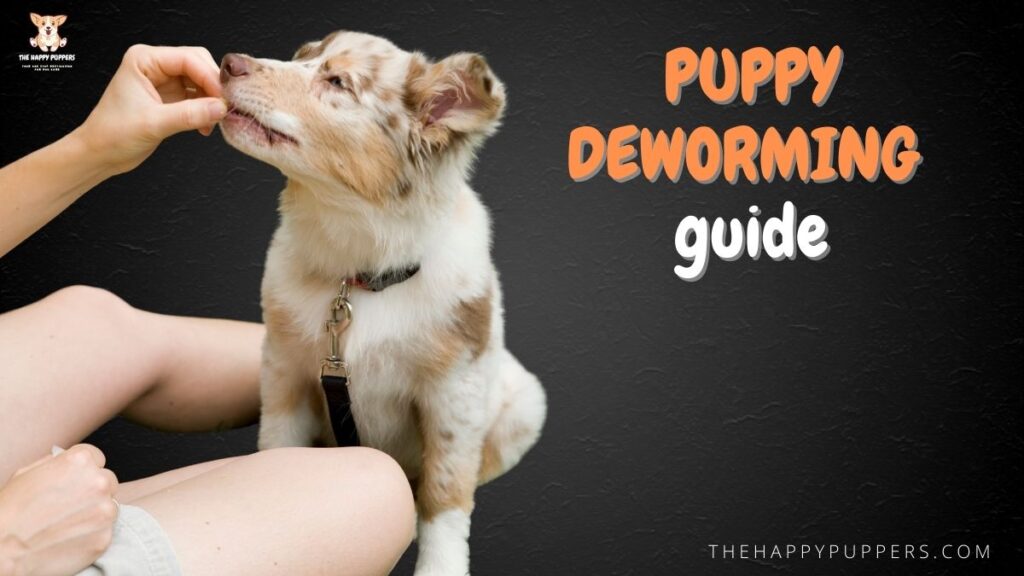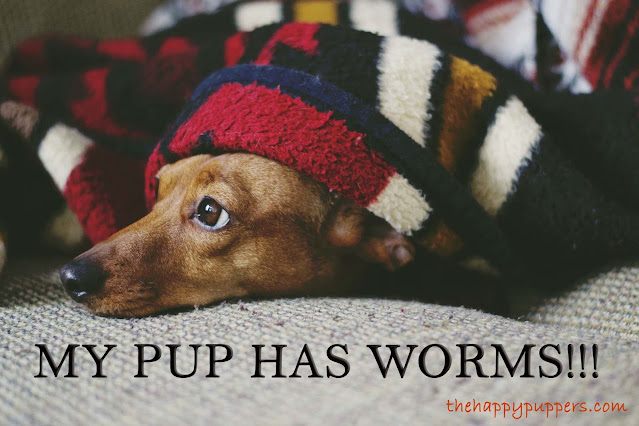‘My pup has worms in his tummy’. Most first-time dog guardians are alarmed when they come to know this. However, this is not something to be alarmed about. Whether you are welcoming a new member into your family or your dog just had a litter, as a dog guardian, it is your responsibility to get started with puppy deworming as well as the training of the new member as a part of the puppy care process. Deworming is an imperative part of dog care which starts during the puppyhood stages and continues throughout life.
Most dogs are born with worms. Those that are not born with worms get infected during the lactation period.
There is no question regarding, do puppies need deworming? It is just when should you do puppy deworming?
Topics covered in this blog post
How is it possible that my pup has worms from the time before birth?
Most dogs contain worm larvae in the immature state in their digestive tract. When these dogs become pregnant, their progesterone levels rises. The increase in the progesterone level causes the larvae to awaken from their dormant state. Once awake, these critters can travel through the uterine wall and into the puppies.
The mother can be administered a deworming medication in advance. This will not eliminate the worms. However, this will reduce the transmission of worms from the mother to the pups. The mother’s deworming should begin around day 40 of the pregnancy and continue till 2 days after puppy’s birth.
Responsible breeders would administer the first dose of puppy deworming medication even before the pups have been weaned from the mother. However, whether the pups have been previously dewormed or not, now that they are a part of your family, it is your responsibility to conduct regular puppy deworming and keep the puppy safe.
Along with mother, the pups may get infested with roundworms via the transmission of the eggs of roundworms.
Getting exposed to the feces of an infected dog or playing outside may be other possible sources of roundworm infestation in puppies.
What are the types of worms which can affect puppies?
Puppies can not only become infected with roundworms, they may also get infected with other worms like hookworms, tapeworms or whipworms.
Hookworms can easily pass through the mother’s milk or womb to the puppies. These larvae generally penetrate the skin and live in the intestines.
Whipworms as the name suggests have a whip type appearance. Puppies generally get whipworms via the eggs of infected animals and feces.
Tapeworms come from flea infestation.
If a puppy has flea infestation and he or she lands of eating the flea, it can cause a tapeworm infection. Furthermore, puppies may also pick up tapeworm from eggs in case of infected animals.
How can you treat the worms your puppy is infected with?
If you’re suspecting that your pup has worms, always go to the veterinarian. Your veterinarian will conduct a test to identify which worm infestation your puppy has.
Most often puppies are infected with roundworms. However, it is always best to make sure of that before you start the deworming medication.
If you want to cover bases regarding all the worms that your puppy might get infected with, then fenbendazole is your best option. This dewormer will target all kinds of worms.
Subscribe to the newsletter so I can send you dog care tips directly in your inbox
When should I start with puppy deworming?
Puppies should be administered their first deworming medication at the age of two weeks. Following this,
- Second dose is administered at 4 weeks
- Third dose at 6 weeks
- Fourth dose at 8 weeks
- Fifth dose at 12 weeks age.
The fifth dose depends on whether or not the pup has worms.
After the fifth dose, it is recommended that the puppy deworming be continued every 3 to 6 months. However, this is not necessary.
The complete puppy deworming schedule
Following is the complete puppy deworming schedule
Dose 1:
The first dose of puppy deworming medication is administered at the age of 2 to 3 weeks. During this period, the mother is still taking care of the pups, grooming them and cleaning the feces which the pups have passed. Along with the puppies, the mother should also be administered deworming medication. If possible, guardians should take care that the mother ingests the least amount of feces.
Dose 2:
The pups are ready for their second dose by the age of 4 weeks. The doses will depend on the puppy’s weight. It may be double or triple times the first doors depending on the weight of the puppy. Large breeds require higher dosage as they age, while pups belonging to small breed will require very little dosage change over time.
Dose 3:
By this time, the pups are at 6-7 weeks of age. The third dose will be the last dose before the puppies get weaned from the mother.
Dose 4:
Around the time of eight weeks of age, the puppies will receive the fourth deworming dose. Around this time, the pup is also ready to receive the first vaccine for parvovirus as well as canine distemper virus. These two vaccines usually come in the form of a combination vaccine.
Dose 5:
This dose is an optional one. This is the time when the puppies go to their new families. Therefore, this dose of deworming medication depends on the new guardians.
It is best to ask the breeder regarding the deworming doses that the puppy has already received and the type. If the breeder informs you that the pup has worms despite of the four doses of deworming medications, it is best that you continue the deworming medication.
You can continue to administer the deworming medication every three to six months for the rest of the puppy’s life to provide the best protection against different types of worms.
Dewormer with Pyrantel is a good option at around four weeks of age. Around six and eight weeks you should try using a dewormer with Fenbendazole. The purpose of using two different families of deworming medication is so that the pup does not build up resistance to any of them.
Most dewormers come in a liquid form. You can mix the required quantity with the puppy’s food. You must make sure that every pup receives the medication.
Do not forget to deworm the mother as well. She can keep spreading the worms to pups.
Chemical dewormers versus natural dewormers
If your pup has worms even after the four deworming doses or if you wish to continue with deworming medications, you need to make a choice as to whether you want to go with the natural deworming method or the chemical deworming method.
Natural deworming methods
Garlic is the most recommended plant based dewormer. It has shown to work wonders to prevent worms. Garlic also prevents fleas in your dog. By preventing fleas, garlic prevents the entry of the worms [tapeworms generally come from fleas].
Your pup may not be inclined to consumed garlic on his or her own. Therefore, you will have to chop up a garlic clove and sprinkle the chopped pieces of garlic on his or her diet. Do this daily for a period of a week. Following this you can repeat this procedure once every 3 to 6 months.
NOTE: If your pup has a severe worm infestation, it can lead to long-term damage. Therefore, if you suspect that your pup has worms in large quantities, consult your veterinarian and use the medication prescribed by him or her. Opt for natural remedy only in case you are sure that the infection is not severe.
Can worms kill puppies?
Yes, unfortunately worms can kill a puppy. That is why it is mostly prescribed to go for a vet prescribed dewormer compared to a natural remedy right from the start. The most common worm which puppies get infected are the roundworms. Roundworms have the ability to kill puppies in many ways, most of which are dependent on their reproduction rate.
Malnutrition:
Whatever the puppy eats, the roundworms ingest it. The crucial nutrients which are needed by the puppy are sloughed off by the roundworms. In the absence of the right amount of nutrients, the organs of the puppy will not properly develop and this may lead to death.
Failure of organs
Roundworms have been known to affect the digestive tract. They can make their way from the digestive tract to other organs like the lungs and heart. This causes respiratory failure in puppies.
Obstruction of the bowel:
Roundworms reproduce very fast. They also die very quick. If there is a large number of roundworms deaths in the intestine of the pup, it will lead to a rupture of the intestinal tract. This will lead to the death of the puppy unless it is surgically treated.
This is the reason why it is imperative that you deworm the puppy during the first eight weeks of age. Deworming is a crucial part of the dog care process. If deworming is not conducted during the initial stages of puppyhood, it can cause a serious risk to the life of the puppy.
My puppy won’t eat ever since he or she has been dewormed
One of the most common problems dog guardians face after the deworming procedure is the lack of appetite. If you notice that your puppy has stopped eating after receiving deworming medications, take him or her to the vet as soon as possible. Do not wait or delay this step.
It is most likely that it is not the medication causing the loss of appetite. However, there are very high chances that your puppy may be facing bowel obstruction which won’t go away on its own.
When the pup is administered the first dose of medication, the medication will paralyze/kill all the viable or living worms. In case your pup has worms in large numbers, there will be a lot of dead worms in the intestine which would try to pass out at the same time. In case a large number of worms try to pass out, it can cause bowel obstruction.
The only way to fix bowel obstruction is by surgery. That is why if after puppy deworming, your pup stops eating, you must immediately rush to the vet.
Is it too late to deworm the pup?
Fortunately, it is never too late to start the deworming process. It is always better to be on the safer-side. Responsible dog guardians will start the deworming process early in the puppyhood stages and keep it going every 3 to 6 months even after the puppy has become a full-grown dog.
Dogs have a tendency to constantly get in dirt and mud and thus are likely to get infected with worms many times in their lifetime.
There is no option of a wonder medication when it comes to deworming a dog. Therefore deworming must be continued every 3 to 6 months.
Should I let the puppy drink mother’s milk after being dewormed?
Most puppies get infected by worms by ingestion of the mother’s milk. Therefore, it is normal for the dog guardian to wonder if the puppy should be allowed to continue breast-feeding after being administered the first dose of puppy deworming medication.
The short answer is yes! The mother’s milk contains colostrum which possesses heaps of nutritional factors, vitamins as well as minerals which are needed for the proper development and growth of the puppy. Therefore, the puppy should not stop breast-feeding.
This is also the reason that the deworming medication is administered every two weeks when the puppy is breast-feeding. This is done so that in case the puppy gets more worms from the mother’s milk, the deworming medication can kill and remove the new worms.
Side effects of puppy deworming
Most dog guardians of not reported any serious side effects after administering the puppy with deworming medication. However, there is a chance that some puppies may experience mild side effects which would automatically go away within 24 hours.
The primary side effects associated with deworming medications are:
- Vomiting and /or diarrhea
- Appetite loss
- Presence of live worms in feces
In case you notice that your puppy is showing lethargy, drooling more than usual or suddenly starts to tremble, your puppy may be facing a drug overdose.
This may sound alarming, but it isn’t an actual emergency. The symptoms should reside within 24 hours of the administration of the deworming medicine. If you notice that the symptoms are lasting over 24 hours, you must take your puppy to the vet.
When is it an emergency?
In case you notice the following symptoms, take your pup immediately to the veterinarian:
- Trouble breathing or wheezing
- Seizures
- Extreme bloating
Some other articles you may find interesting:
Seizures in dogs: Causes, symptoms, types, Treatments
Halloween safety tips for dogs
Benadryl for dogs. Is it safe? Other herbal alternatives
Oh my God! I saw live worms in my puppy’s stool! Is this normal?
Seeing worms in your puppy’s stool is totally normal and nothing to be worried about at all. The prime objective of the puppy deworming medication is to remove the worms from your pup’s intestine, not necessarily destroy or kill them.
The deworming medication works by paralyzing the worms, making it much easier for the intestines to expel them.
Once the medication wears off from your pup, the worms won’t be paralyzed anymore. This is when you may notice the worms moving about. Therefore, it is advisable to work quickly and remove the dog or pup’s feces once they are done with their business.
Conclusion:
A new member’s entry brings ton of joy as well as responsibilities. You are responsible for the new puppy’s care, training etc.
Now you know that if your pup has worms, it is nothing to be worried about. You must follow the deworming schedule strictly and administer puppy deworming medications to your pups. Deworming is a very important part of dog care. Remember to keep a close eye on your pup for a period up to 24 hours after the administration of the deworming medication. In case you notice any unusual symptoms, contact the vet immediately.
If you still have any queries pertaining to the deworming process, mention them in the comment section below, so I can address it as soon as possible. You can also email me your queries or reach out to me on any of my social media channels.
If you found this article informative, please subscribe to the blog, so I can send you dog care tips regularly in your inbox.
I will see you in my next blog post
Shruti


